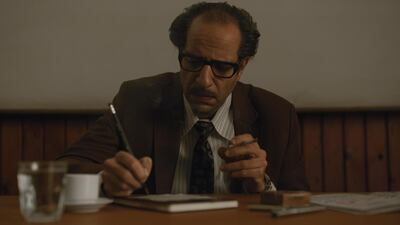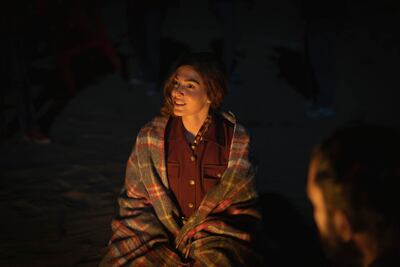Paranormal, Netflix's first original Egyptian series, marks a confident leap forward for Arabic thrillers.
The show, which premieres on the streaming platform on Thursday, November 5, is based on the bestselling novel series by the late Ahmed Khaled Tawfik. The author wrote more than 200 paperbacks in his lifetime and is often hailed as the first contemporary horror and science-fiction writer in the Arab world.
Set in the 1960s, Paranormal centres on haematologist Refaat Ismail, played by Ahmed Amin, who tries to uncover the truth behind a series of supernatural events.
The show's blood-curdling scenes, such as hide-and-seek games featuring spooky unblinking children with wide icy smiles, certainly make it an eerie watch. The show isn’t the first Arabic-language thriller to be produced in the region, far from it, but we’ve seen nothing quite of this caliber from the Arab world before.
While unnervingly tense, the six-episode show is unexpectedly funny, too, in a subtle, deadpan way. This is largely thanks to the way Egyptian actor Amin portrays the neurotic but laconic Ismail.
The frazzle-haired haematologist is at the heart of the show. On one hand, he is trying to find proof – as a man of science – that these paranormal events, which date back to his childhood, are a figment of a collective imagination.
On the other, he is caught in an uncomfortable love triangle between his fiancee Howaida Abdel Moniem (Ayah Samaha), a music teacher, and Maggie Mckillop (Razane Jammal), a Scottish physician and Ismail’s old college cohort.
Amin’s background as a stand-up comedian brings a humorous edge to the character’s nihilistic and acerbic demeanour. But the Egyptian actor says it was easy to portray the gloomy and brooding Ismail with such flair, since the comedy was already present in the original source material.

"While my experiences in comedy helped, the sarcastic and comic parts were part of the original make-up of the character in the novels, and were faithfully brought to the script," he tells The National.
Amin says the show’s directors – Amr Salama and Majid Al Ansari – helped him flesh out the character in a way that fans of the original novels would find familiar.
"We worked together to make sure we stayed true to the character's nature in the original novels; to bring this haematologist, who is afflicted with his own set of illnesses, faithfully to the screen," says Amin, adding that he is a long-time fan of the Paranormal series, and reread the novels before the shoot earlier this year to make sure he could best portray the character.
“It was a responsibility, playing a character that more than 15 million readers were already well-acquainted with."
The show, which will be released to all 190 countries within Netflix’s reach, will introduce Tawfik’s world to an unprecedentedly large audience. It will be dubbed in more than nine languages, including English, Spanish, French and German, and subtitled in 32 languages.
Salama, who is also the show's creator and lead writer, has been trying to bring Tawfik's novels to the small screen for more than a decade. When finally given the opportunity, the Sheikh Jackson and Excuse My French director watched more than 50 horror films from across the world to prepare for the adaptation.
"I watched The Shining and The Exorcist, as well as horror films from Japan, South Korea, Spain and Sweden. I've been a fan of the genre since I was young and I rewatched a lot of my favourites to understand what it was about those films that attracted me to them," he says. He also watched a number of Egyptian horror films, including El Ens Wal Jinn (The Humans and the Jinns) which stars veteran actors Adel Imam and Youssra.
The horror was in the details, Salama says, so it became imperative to make every scene as lifelike as possible, with every shot, prop and character grounded in the reality of 1960s Cairo.
“It was definitely a challenge,” he says. “I was lucky that we worked with some very talented set designers, as well as special effects artists. We even made sure the pavements were as they were in Cairo at that time. Cairo is a rapidly changing city; streets today don’t seem the same tomorrow. But we made it work.”
Trying to encapsulate a character from that time period was no straightforward task, either. Jammal says while she found herself disagreeing with the choices her character makes at the beginning of the show, she eventually came to appreciate how Mckillop was ahead of her time.
“It was a challenge to understand Maggie and to love her, and I did. Every day I would give her a chance and I would learn more about her, and I finally saw how she’s independent and forward-thinking and honest,” Jammal says. “The love between Maggie and Refaat is a journey; it’s deep and beautiful. And that’s what I had to learn and accept and explore.”
Jammal travelled to Scotland almost immediately after learning she had got the part. The Lebanese-British actress – who is known for her roles in Djinn and the short Kanye West film Cruel Summer – began taking dialect lessons and researching what Scotland was like in the '60s.
“It was important for me to portray her accurately and get a sense of the Scottish culture and how Scotland and Egypt were at the time.”
Samaha, who plays Ismail’s fiancee Howaida, says she was impressed by how much her character developed within the show, challenging social norms of the time and establishing her own independence. “I loved her,” she says. “She turned out to be a strong woman, who refused to go with the path that was drawn for her and instead forged her own.”
One of the most difficult challenges for the Grand Hotel actress was "acting with demons".
“I knew they were sweet people in real life and under all that make-up. On one hand, I was terrified of them and on the other, I wanted to make sure they were OK and if they needed a break or water.”

Perhaps what is most noticeable about the show, besides its high production value, is its six-episode format, which defies the usual month-long TV series trend in the region. Freed from those chains, the show does not needlessly stretch the plot to a doughy thinness, nor hurriedly wrap up storylines in a porous attempt to bring things to a close.
The storytelling, for the most part, is well-honed. There are a few cliched thriller tropes, but they are easy to forgive when you consider how they are used and the setting in which they take place.
“Premium drama is still a new concept in the Arab world,” the show's producer, Mohamed Hefzy, says. “Netflix, and the streaming platform format, is helping it gain momentum.
"There’s no doubt the show will pave the way for more genre offerings. We can expect to see a lot fantasy, horror, and thriller films and television shows coming out of the region soon.”





